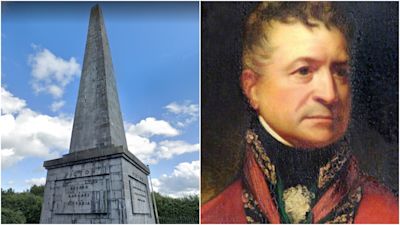Carmarthen's Thomas Picton monument to stay but with new sign referencing slavery links

A monument honouring Sir Thomas Picton will stay put in Carmarthen and will not be renamed, following public feedback and a consultation.
A cross-party group was set up within Carmarthenshire County Council earlier this year to review the obelisk, known as the Picton Monument, after a petition to change its name gathered almost 20,000 signatures.
The group recommended that instead, "prominently placed information boards" should be erected near to the monument. These should include "reference to Sir Thomas Picton encompassing his military career as well as his known links with slavery".
Thomas Picton was a high-ranking military officer killed in 1815 at the Battle of Waterloo but he was also known as the "Tyrant of Trinidad" because of his brutal ruling of the island and the people living there.
Sir Thomas Picton served as a governor in Trinidad and was known for his brutal regime on the island.
In 1806 he was convicted of ordering the illegal torture of a 14-year-old girl, Louisa Calderon. He admitted to the charge but the conviction was later overturned.
He was also accused of profiting hugely from the, then legal, slave trade.
A statue of Picton in Cardiff City Hall has been boarded up after a vote was passed to remove it entirely.
Carmarthenshire council's Equality and Diversity Task and Finish Group held a consultation over six weeks and gathered feedback from almost 2,500 members of the public.
The group also spoke to the Race Council for Wales, the Llanelli Multicultural Network and Carmarthen Town Council.
Cllr Cefin Campbell, Chair of the Task and Finish Group said: "Our main focus was getting people’s opinions. Some 73 per cent of respondents were from Carmarthenshire, and a third were from Carmarthen itself.
"In general, the opinion was two to one in favour of keeping the monument as it stands, but even within that percentage there were people saying that it’s important that we teach people about Picton - learning of his history and the history of the area as well."
The group concluded that the monument should not be renamed or taken down but should instead include information boards that reference the military life of Picton as well as his links to slavery.
They also said the boards should include information on the local history of the area, including the Rebecca Riots - a series of protests over economic conditions for farmers in the 1800s in rural parts of Wales.
A portrait of Picton also exists in Carmarthen's Guildhall and so the group suggested a similar information plaque be placed there too.
Carmarthenshire County Council have agreed to the recommendations and said QR codes will be put on the boards so that people can access more information.
A recent audit found that Wales has more than 200 statues, monuments, buildings and streets dedicated to historical figures linked to slavery.
The review, led by Gaynor Legall, found that commemorations of people connected with the slave trade are often shown without any accompanying interpretation to address contentious aspects of their history.
Welsh Government ordered the review to take place following the death of George Floyd in the US and the toppling of the statue of Edward Colston in Bristol during a series of Black Lives Matter protests.